Moonshadows
Moonshadows
Moonshadows
Conventional Truth in Buddhist
Philosophy
THE COWHERDS


Oxford University Press, Inc., publishes works that further
Oxford Universitys objective of excellence
in research, scholarship, and education.
Oxford New York
Auckland Cape Town Dar es Salaam Hong Kong Karachi
Kuala Lumpur Madrid Melbourne Mexico City Nairobi
New Delhi Shanghai Taipei Toronto
With offices in
Argentina Austria Brazil Chile Czech Republic France Greece
Guatemala Hungary Italy Japan Poland Portugal Singapore
South Korea Switzerland Thailand Turkey Ukraine Vietnam
Copyright 2011 by Oxford University Press, Inc.
Published by Oxford University Press, Inc.
198 Madison Avenue, New York, NY 10016
www.oup.com
Oxford is a registered trademark of Oxford University Press
All rights reserved. No part of this publication may be reproduced,
stored in a retrieval system, or transmitted, in any form or by any means,
electronic, mechanical, photocopying, recording, or otherwise,
without the prior permission of Oxford University Press.
Library of Congress Cataloging-in-Publication Data
Cowherds (Authors)
Moonshadows : conventional truth in Buddhist philosophy / the Cowherds.
p. cm.
Includes bibliographical references and index.
ISBN 978-0-19-975142-6; ISBN 978-0-19-975143-3 (pbk.)
1. TruthReligious aspectsBuddhism. 2. Buddhist philosophy.
I. Title.
BQ4255.C69 2011
121.0882943dc22 2009050158
9 8 7 6 5 4 3 2 1
Printed in the United States of America
on acid-free paper
Preface
This is an unusual volume. It is neither an anthology nor a monograph. We prefer to think of it as a polygrapha collectively written volume reflecting the varying views of a large collection of authors. Many chapters are written by single authors. Some are written by teams. But every chapter is informed by extensive discussion among us, both of general philosophical and exegetical issues and of the chapters themselves. So, in an important sense, no matter whose name appears at the head of each chapter, the chapter is the fruit of extensive collaboration. This is so despite the fact that we recognize substantial differences among us regarding interpretation and philosophy. We believe that those differences, as much as the agreements that have emerged from our collective effort, as well as the connections between these essays, which have been forged in argument, add to the richness of this treatment.
The volume is written by the Cowherds. First a comment is in order about the name. Those familiar with Madhyamaka literature will recognize the reference to Candrak rtis phrase, what even people like cowherds and women recognize (gop
rtis phrase, what even people like cowherds and women recognize (gop l
l
 gan
gan janaprasiddha).longer acceptable. There is a whiff of classism in the use of cowherds (gop
janaprasiddha).longer acceptable. There is a whiff of classism in the use of cowherds (gop la, gopa, gop
la, gopa, gop ; Tibetan glang rdzi, gnag rdzi) as well. But we hope that the irony in our use of this term to refer to ourselves is apparent. We hope that we can appropriate cowherds as a synonym for the man on the street, to indicate the ordinary working person. What cowherds know, in this sense, is what you need to know to do whatever you do, whether it be dairy farming or philosophy. To paraphrase JFK, we are all cowherds! Of course, what it is that we each, or we all, need to know, is not clear. Hence this bookan exploration of conventional truth and what is true about it.
; Tibetan glang rdzi, gnag rdzi) as well. But we hope that the irony in our use of this term to refer to ourselves is apparent. We hope that we can appropriate cowherds as a synonym for the man on the street, to indicate the ordinary working person. What cowherds know, in this sense, is what you need to know to do whatever you do, whether it be dairy farming or philosophy. To paraphrase JFK, we are all cowherds! Of course, what it is that we each, or we all, need to know, is not clear. Hence this bookan exploration of conventional truth and what is true about it.
Caveat lector! We should be clear that, while this book is about conventional truth and while it is firmly anchored in Madhyamaka ideas about conventional truth (sa v
v tisatya, vyavah
tisatya, vyavah rasatya), it is not a history of the concept of conventional truth in Buddhist philosophy; it is not a philological study of Buddhists texts or doctrines on conventional truth; it is not an attempt to present a fair and balanced representation of Buddhist accounts of conventional truth. Instead, it is an exploration, by a diverse group of philosophers with a set of related interests, of a set of questions about conventional truth that arise from the way the idea of conventional truth is deployed in certain corners of Buddhist philosophy.
rasatya), it is not a history of the concept of conventional truth in Buddhist philosophy; it is not a philological study of Buddhists texts or doctrines on conventional truth; it is not an attempt to present a fair and balanced representation of Buddhist accounts of conventional truth. Instead, it is an exploration, by a diverse group of philosophers with a set of related interests, of a set of questions about conventional truth that arise from the way the idea of conventional truth is deployed in certain corners of Buddhist philosophy.
In particular, we are animated by four principal questions that arise primarily from a consideration of Candrak rtis treatment of this topic and the way his treatment is taken up by subsequent Buddhist scholars, prominently including Tibetan commentators:
rtis treatment of this topic and the way his treatment is taken up by subsequent Buddhist scholars, prominently including Tibetan commentators:
1. What is conventional truth?
2. What is true about conventional truth?
3. How flexible is conventional truth? How much can it be revised?
4. What are the implications of all of this for how we live our lives?
The first question forces us to start textually and doctrinally, to figure out what Candrak rti, those with whom he was in dialogue, and those who read and commented on him understood by sa
rti, those with whom he was in dialogue, and those who read and commented on him understood by sa v
v tisatya or vyavah
tisatya or vyavah rasatya. The second, third, and fourth, though, take us well beyond exegesis and into philosophical puzzles, albeit puzzles anchored in and arising from the Buddhist tradition. In what sense is something true that in another is characterized as entirely false, misleading, to be taken seriously only by fools and cowherds? How fixed is it? If it is determined by conventions, and if conventions are malleable, is conventional truth similarly malleable? And what is its import for ethics, for science, for epistemology?
rasatya. The second, third, and fourth, though, take us well beyond exegesis and into philosophical puzzles, albeit puzzles anchored in and arising from the Buddhist tradition. In what sense is something true that in another is characterized as entirely false, misleading, to be taken seriously only by fools and cowherds? How fixed is it? If it is determined by conventions, and if conventions are malleable, is conventional truth similarly malleable? And what is its import for ethics, for science, for epistemology?
In addressing these questions we may do philosophy with Candrak rti, but we are beholden neither to him nor to anyone else in the Buddhist tradition when we answer those questions. We are after truth, or at least insight, not just understanding of antique positions. For this reason, many of the essays in this volume are not textual at all but are systematic philosophical explorations of questions raised, but not answered, by classical Buddhist texts. We are, after all, contemporary philosophers with contemporary concerns and a conviction that we can address those concerns in part by attention to Buddhist thought.
rti, but we are beholden neither to him nor to anyone else in the Buddhist tradition when we answer those questions. We are after truth, or at least insight, not just understanding of antique positions. For this reason, many of the essays in this volume are not textual at all but are systematic philosophical explorations of questions raised, but not answered, by classical Buddhist texts. We are, after all, contemporary philosophers with contemporary concerns and a conviction that we can address those concerns in part by attention to Buddhist thought.
This commitment to philosophy of course raises interesting methodological questions about Buddhist studies. Are we doing real Buddhist studies when we deploy ideas and techniques from contemporary analytic philosophy to address questions arising from seventh-century Indian debates as adumbrated in fifteenth-century Tibet? We think so. And we think that Buddhist philosophy has much to contribute to twenty-first-century Western philosophy. We also think that contemporary philosophy has much to contribute to Buddhist thought. We hence hope that our explorations will be of interest both to those who care deeply about what
Next page

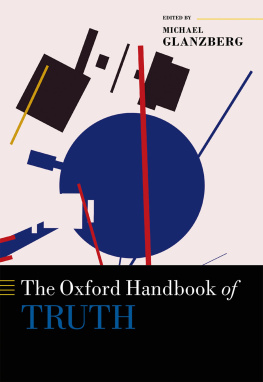
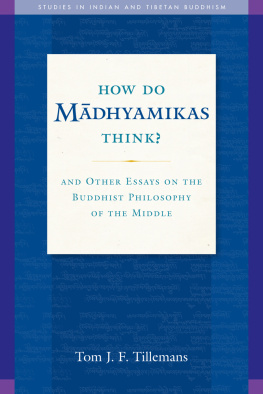


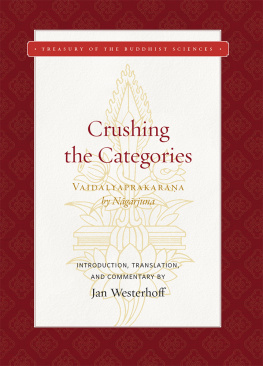
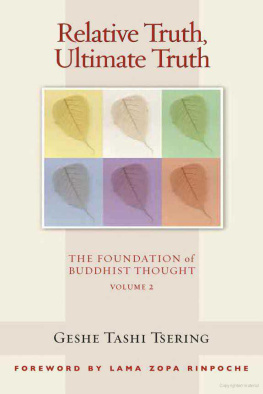
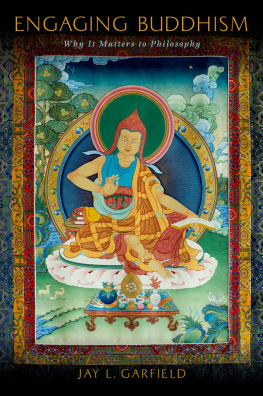

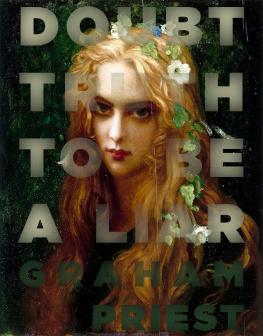
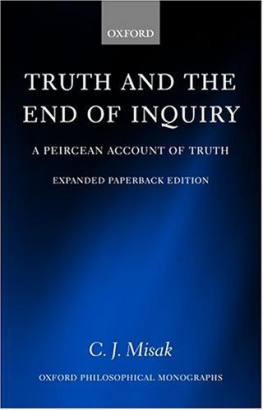
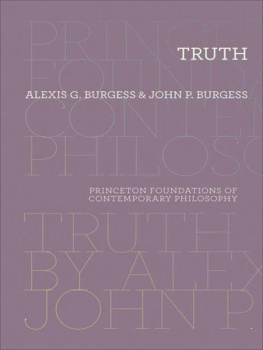


 rtis phrase, what even people like cowherds and women recognize (gop
rtis phrase, what even people like cowherds and women recognize (gop l
l gan
gan ; Tibetan glang rdzi, gnag rdzi) as well. But we hope that the irony in our use of this term to refer to ourselves is apparent. We hope that we can appropriate cowherds as a synonym for the man on the street, to indicate the ordinary working person. What cowherds know, in this sense, is what you need to know to do whatever you do, whether it be dairy farming or philosophy. To paraphrase JFK, we are all cowherds! Of course, what it is that we each, or we all, need to know, is not clear. Hence this bookan exploration of conventional truth and what is true about it.
; Tibetan glang rdzi, gnag rdzi) as well. But we hope that the irony in our use of this term to refer to ourselves is apparent. We hope that we can appropriate cowherds as a synonym for the man on the street, to indicate the ordinary working person. What cowherds know, in this sense, is what you need to know to do whatever you do, whether it be dairy farming or philosophy. To paraphrase JFK, we are all cowherds! Of course, what it is that we each, or we all, need to know, is not clear. Hence this bookan exploration of conventional truth and what is true about it. v
v tisatya, vyavah
tisatya, vyavah